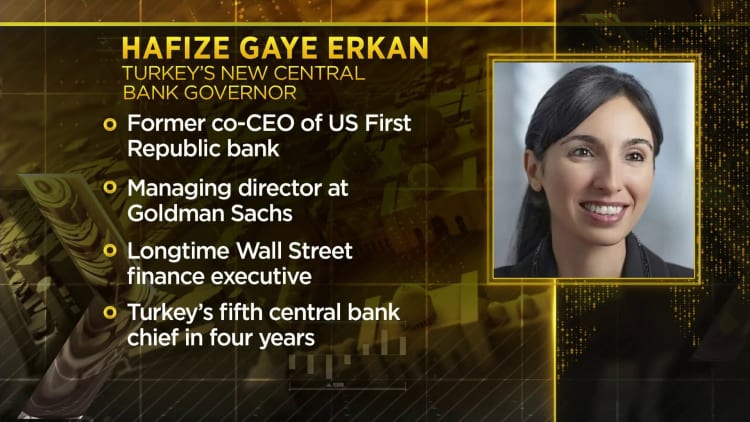
Exterior of the Turkish Central Bank, known as Turkiye Cumhuriyet Merkez Bankasi in Ankara.
Nurphoto | Nurphoto | Getty Images
Turkey’s President Recep Tayyip Erdogan has appointed a former Wall Street banker Hafize Gaye Erkan as the country’s new central bank governor — another move that could potentially mark a policy pivot away from economic unorthodoxy.
Erkan, Turkey’s first female central bank chief, was a former managing director at Goldman Sachs and co-CEO at First Republic Bank.
She is also Turkey’s fifth central bank governor in four years.
Her appointment, alongside new economy minister Mehmet Simsek‘s, could be a sign that Turkey’s monetary policy will normalize following years of ultra-low borrowing costs and soaring inflation, analysts say.
“Given her training at Princeton and her top-level experience in the U.S. banking sector, I assume that the new governor will return to orthodox policies,” Selva Demiralp, a professor of economics at Koç University in Istanbul, told CNBC in an e-mail.
The caveat would lie in how much autonomy the central bank could exercise, and to what extent —something that Demiralp says investors will have to wait and see.

That verdict could come as soon as two weeks when the central bank convenes for an interest rate decision meeting.
Demiralp expects a rate hike in the next central bank meeting, “taking the policy rate to a level of around 25 percent or higher could be a good first step,” she said.
Over the weekend, Turkish President Recep Tayyip Erdogan appointed former economy chief Simsek as the new treasury and economy minister. He was known for his market friendly policies.
Timothy Ash, senior emerging markets sovereign strategist from BlueBay Asset Management, told CNBC that “markets will be doubly pleased” by Erkan’s appointment as central bank chief.
He said both Erkan and Simsek will make a “top notch team.”
Erkan’s predecessor Sahap Kavcioglu was named head of the Banking Regulation and Supervision Agency (BRSA), according to the Official Gazette.
“Simsek and Erkan will be judged on monetary policy moves, inflation and lira. Guess Erdogan saw some use in keeping Kavcioglu in the wings,” Ash said in a tweet.
“Appointment of Kavcioglu at BRSA has complicated things for Simsek,” Ash said in another tweet, adding that markets will focus on whether the Simsek-Erkan partnership can deliver policy tightening sufficient to save the freefalling lira.
Erdogan had fired Kavcioglu’s predecessor Naci Agbal in March 2021, two days after the central bank raised interest rates.
The Turkish lira has been extending its plunge since the reelection of Erdogan, and last traded at 23.47 against the dollar.
The country’s annual inflation rate for May recorded a figure of 39.59%. Last October, Turkey’s inflation rate soared to a lofty level of 85.51%.
